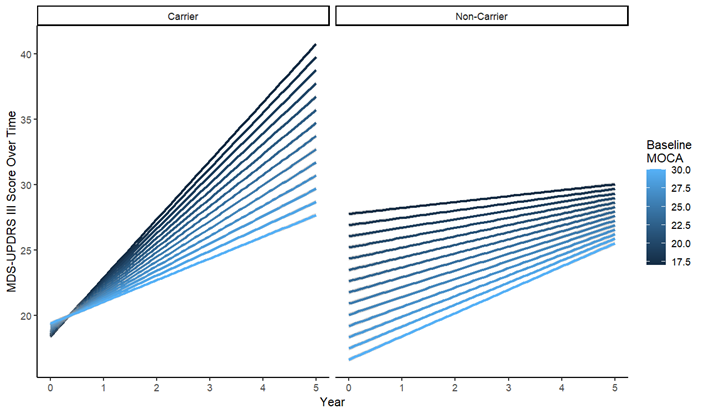Category: Parkinson's Disease: Genetics
Objective: To evaluate the relationship between APOE e4 genotype, cognition, and motor progression in early Parkinson’s disease (PD).
Background: The Apolipoprotein E (APOE) e4 genotype is associated with progression of cognitive decline in Parkinson’s disease (PD) with recent evidence suggesting an association with motor progression as well. However, it is not clear if APOE genotype is directly or indirectly related to cognitive and motor progression.
Method: Data from the Parkinson’s Progression Markers Initiative (PPMI) were analyzed longitudinally at one-year intervals for five years. From the PPMI data set, 417 participants were included in the analysis (146 females, 271 males; average time since diagnosis = 6.6 months; APOE e4 carriers = 106, non-APOE e4 carriers = 311). Linear mixed effects models were used to analyze the effects of APOE e4 genotype on cognition (Montreal Cognitive Assessment (MoCA)) and on motor performance (Movement Disorder Society Unified Parkinson’s Disease Rating Scale motor subscale (MDS-UPDRS III)) over the 5 years. Structural equation modeling was used to conduct a mediation analysis to determine the relationship of these effects, with cognitive decline presumed to mediate the effect of APOE e4 on motor progression.
Results: APOE e4 carriers demonstrated more rapid declines in cognition and motor performance than non-carriers. MoCA scores worsened by 0.25 more points per year in carriers than non-carriers (p = 0.005). MDS-UPDRS III scores worsened by 0.75 more points per year in carriers than non-carriers, resulting in a 3.75-point difference in MDS-UPDRS III change over the 5-year study period (p = 0.012) which exceeds the minimal clinically important difference (3.25 points). A three-way interaction was found between APOE e4 status, time, and cognition. Mediation analysis revealed a significant indirect effect of APOE e4 status on motor performance through an effect on cognition (p = 0.028), but no significant direct effect on motor performance (p = 0.686). These findings were consistent in both on and off phases of PD medication.
Conclusion: Our results are consistent with recent findings indicating an effect of APOE e4 genotype on both cognitive decline and motor performance. Our findings suggest that the process by which APOE e4 genotype affects motor performance is through its effect on cognition.
[figure1]
To cite this abstract in AMA style:
M. Gevertzman, A. Hooyman, J. Longhurst, M. Landers. Apolipoprotein E e4 genotype affects early motor progression in Parkinson’s disease through an effect on cognition [abstract]. Mov Disord. 2023; 38 (suppl 1). https://www.mdsabstracts.org/abstract/apolipoprotein-e-e4-genotype-affects-early-motor-progression-in-parkinsons-disease-through-an-effect-on-cognition/. Accessed March 29, 2025.« Back to 2023 International Congress
MDS Abstracts - https://www.mdsabstracts.org/abstract/apolipoprotein-e-e4-genotype-affects-early-motor-progression-in-parkinsons-disease-through-an-effect-on-cognition/

